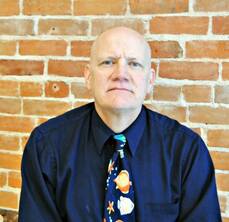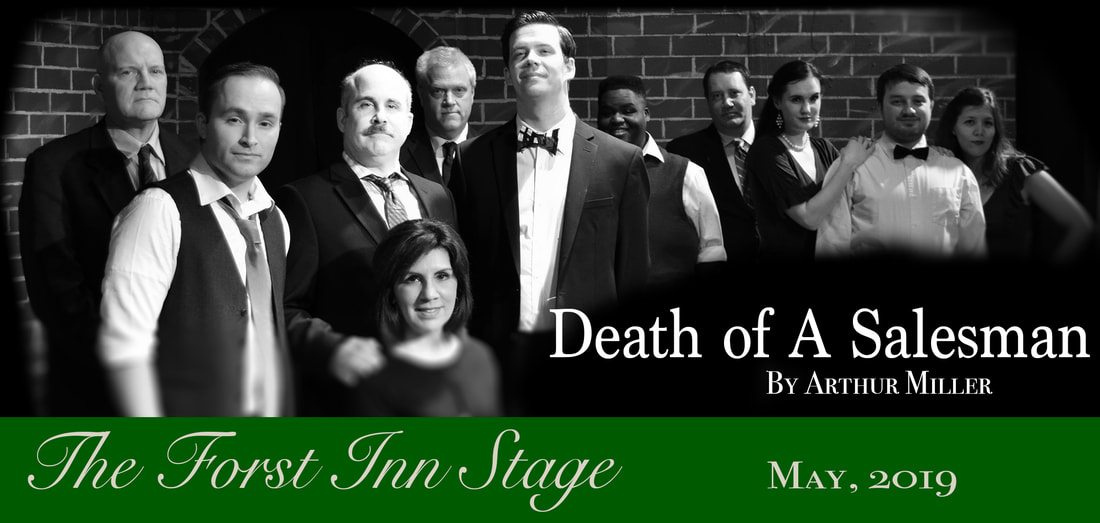History: 2019 Performances
Attention Must Be Paid!
Performance Dates: 5/10, 11, 17, 18, 19*, 23, 24, 25
Willy Loman’s career is over. During a pivotal 24 hours, he reflects on his life as a father, husband and traveling salesman. Truth and lies intermingle as Willy tries to reconcile the optimism of his youth with his unfulfilled dreams. As the full force of reality crashes down on him, he places his last hope of success in his two sons. Arthur Miller’s classic play challenges us to reconsider what it means to succeed and the cost of chasing the American Dream. A thrilling work of deep and revealing beauty that remains one of the most profound classic dramas of the American theatre.
|
Our Cast:
Willy - Jeremy Pelegrin Linda - Vicki Svacina Biff - Thomas Moore Happy - Ian Wisneski Howard - Corey Mcelroy Uncle Ben - Daniel Sallinen Charlie - Glen Sellen Bernard - Kevin James Sievert Miss Forsythe - Elizabeth Szyman The Woman - Haley Ebinal Jenny - Julie Augsberger Letta - Katie Schroeder Stanley - Sean Stalvey Stage Manager - Tessa Komorowski Props Master - Phillip Jindra Costumes - Claran LaViolette Directed by Michael Sheeks |
|
Meet The Ensemble

Jeremy Pelegrin (Willie Loman) returns to the Forst Inn after appearing in 2018’s Hello Again and Putnam County Spelling Bee. In the Green Bay area, Jeremy has enjoyed performing with Daddy D Productions, Birder Players, St. Norbert Music Theatre, Theatre Z, and Evergreen Productions, where he was last seen in the title role of Lombardi. Jeremy earned his Theatre Arts degree from UW Stevens Point and went on to perform at dinner theaters and theme parks around the country. His Florida credits include Walt Disney World, Universal Studios, Busch Gardens Tampa Bay, Mark II Dinner Theatre and The Golden Apple. Some of Jeremy’s favorite roles have been in They’re Playing Our Song (Vernon), Into the Woods (Jack), You’re a Good Man...(Charlie Brown), The Baltimore Waltz (Carl), Annie (Rooster), and Monty Python’s Spamalot (Sir Galahad). Jeremy is very proud to be a part of the historic Forst Inn’s 2019 Season!

Vicki Svacina (Linda Loman) has always enjoyed performing at the Forst. She was fortunate enough to have been part of several productions during the Ron Kaminiski years. She is equally thrilled to have been part of two productions under Michael Sheeks, “The Glass Menagerie” and “Death of a Salesman.” Her most recent role was that of “Charmaine” in the February Masquers production “Sex Please We’re Sixty.” Vicki has performed in numerous community theatrical productions throughout the years. Some of her favorites
include “Bedtime Stories”, “The Long Weekend” and “Enchanted April”. Vicki was honored to have been President of Masquers from 2015-2018. She enjoys her involvement as a board member of both Masquers and the Domestic Violence Center. Please make sure to join Vicki and her fellow cast mates this coming August at the Forst when they perform “Becky’s New Car.”
include “Bedtime Stories”, “The Long Weekend” and “Enchanted April”. Vicki was honored to have been President of Masquers from 2015-2018. She enjoys her involvement as a board member of both Masquers and the Domestic Violence Center. Please make sure to join Vicki and her fellow cast mates this coming August at the Forst when they perform “Becky’s New Car.”

Thomas Moore (Biff Loman) is very excited to be back at the Forst Inn after his recent performance in The Shape of Things. His previous credits would include voicing three male characters in The Smell of The Kill. Other local credits would include Bobby in Exit Laughing, Jay Gatsby in The Great Gatsby, Robert in Proof, CB in Dog Sees God, Paul in A Chrous Line, as well as many other Masquers productions throughout the years. After spending a few years studying theatre at Uw-Parkside, he loves to help bring great theatre to the lakeshore. He'd like to thank friends and family for their support.

Ian Wisneski (Happy Loman) is excited to be back on stage at The Forst Inn. It has become one of his favorite venues, because of the amazing atmosphere and the people he gets to work with. He is looking forward to more shows here, and can't wait to do more professional theater!

Glenn Sellen (Charlie) started acting in 2003. It seemed like a good idea to him at the time. Among other roles, he has played Frederic in Pirates of Penzance, Simeon in Joseph and the Amazing Technicolor Dreamcoat, and most recently as Edward Ferrars in Sense and Sensibility. While living near Manitowoc, he was a vocalist with Lakeshore Wind Ensemble and Big Band. Glenn is very grateful that his wife, Candi, has let him pretend to be other people for so many years. Glenn is happy to be in his first production at The Forst Inn.

Kevin James Sievert (Bernard) is a Wisconsin based actor and musician who is proud to have been a part of the Forst Inn family since its re-opening in 2017. Kevin made his professional theatrical debut in Milwaukee at Skylight Music Theatre in 2017, and has participated as a director/choreographer for various productions with Forst Inn and The Masquers, Inc. in Manitowoc. Outside of performing, Kevin can be found at Plymouth High School teaching voice in their choir department, slinging coffee at Wrap It Up, Manitowoc, and relaxing. with family and friends. He hopes you enjoy the 2019 season and keep coming back for more!

Dan Sallinen (Uncle Ben) is extremely excited to making his Forst Inn debut. He is a Door County native and life-long lover of the theater. Dan made his first appearance on stage with Rogue Theater’s production of “The Belgian Detective”. Since then he has appeared in many shows including “Riverside Drive”, “All My Sons”, “Ma’s Case”, and “Beer for Breakfast”, as well as improvisational, skit comedy shows, and staged readings. He has also appeared at Isadoora Theater in “Proof” and Third Avenue Playhouse in “Right to Live!” Dan would like to thank his wife Amanda and his family for all their support.

Corey McElroy (Howard) is excited to return to theatre after a twenty year break from acting. Corey was active in theatre in high school and college. He was last seen in various productions at Theatre on the Bay in Marinette, WI and Viterbo University in La Crosse, WI. Some of his favorite roles include Kenickie in Grease, Matt in The Fantasticks, Jay in Lost in Younkers, and The Lord Chancellor in Iolanthe.

Haley Ebinal (The Woman) is an actor, singer, dancer, and violinist, currently in her senior year at the University of Wisconsin-Green Bay, studying Theatre Performance and Philosophy. She has received two nominations for the Irene Ryans award for her performances as Marie Antoinette (The Revolutionists) and Inez (No Exit). Haley also studied at the Open Jar Institute in New York City, where she studied with Broadway professionals in dance, musical theatre voice, and acting. She is also the director of Riot Act, an original devised play and collection of monologues by Franca Rame currently touring the Midwest. Follow Haley’s latest projects at: www.haleyebinal.com

Elizabeth Szyman (Miss Forsyth) has performed and studied theatre and film in Massachusetts, New York, and Wisconsin. This is Elizabeth’s fourth performance with the Forst Inn Arts Collective, other roles include playing Evelyn in The Shape of Things, Beth in “Dinner with Friends” and Molly in “Smell of the Kill.” Previous local highlights include Rachel Ann in “Exit Laughing,” Daisy Buchanan in “The Great Gatsby” and Sarah in “Company.” She is grateful to her family and friends for all their T.L.C. as well as the support and hard work of the cast and crew.

Katie Schroeder (Letta) is thrilled to be back on the Forst Inn stage with some of her favorite people. Previous shows at the Forst Inn include The Shape of Things (Jenny), “Dinner with Friends” (Karen) and “The Odd Couple (female version)” (Vera). She was most recently seen in Green Bay for Evergreen Theater’s “Sense & Sensibility” (Elinor Dashwood) and "It's a Wonderful Life" (Mary Hatch Bailey). When not playing with her theatre friends, she can be found slinging coffee, attending classes, or planning her next international adventure. She is honored to be included in a production that holds so much meaning to Thomas and Elizabeth. She hopes you enjoy the show!

Sean Stalvey (Stanley) has previously been in multiple theatre productions at the Forst Inn including Hello Again, November, “The Glass Menagerie” and “The 39 Steps”. Sean began his interest in theatre in high school and with the Peter Quince Performing Company, playing Flute and Piccolo in the pit orchestras. He started to pursue theatre on-stage at UW-Manitowoc, where he earned the 2018 UW-Manitowoc Fine Arts in Theatre Award. Having graduated with an Associate of Arts and Science Degree at UW-Manitowoc, Sean is currently a student at UW-Green Bay pursuing a bachelor’s degree in Theatre. In his free time, Sean enjoys astronomy and watching movies.

Julie Augsberger (Jenny) is pumped up to be back for her second performance at The Forst Inn, after playing Sylvie in The Odd Couple last spring. Julie took piano lessons for 5 years starting at 7. She then moved on to the clarinet playing with the concert band all through high school. Julie is a newcomer to stage acting but with her recent “semi-retirement” she hopes to spend more time performing in plays and volunteering.
Commentary on The Original Production
"Many consider Arthur Miller's Death of a Salesman to be his finest play. It's a work that emphasizes the hollowness and bitterness of a generation that lived through the Great Depression, hoping for salvation through material success, only to find that success a meaningless delusion. Now, Ford's Theatre is giving a very polished production to Salesman, one that leaves no doubt as to why this play has remained so beloved since it was first produced in 1949.
The play takes place in the late 1940s. It is a montage of present-day fact mixed with daydreams, memories, and hallucinations, which make up the last 24 hours of Willy Loman's life. A 63-year-old salesman who has spent his adult life making sales calls through the northeastern United States, Willy and his wife, Linda, have two grown sons, Biff and Happy, and have lived in the same house for the last 25 years. Willy is not a successful father, a faithful husband, or an above-average salesman, as he brags he is. Rather, he is an egotist who doesn't appreciate his wife and children and cannot acknowledge his failure as a salesman.
The play begins with Willy coming home exhausted after a sales trip. Biff has unexpectedly returned from working in Texas as a ranch hand and Happy has come home to see Biff. The brothers reminisce about their childhood and discuss their father's mental state. Both have noticed his indecisiveness and daydreaming. Willy walks in, furious that the two boys have never amounted to anything. Trying to calm their father, Biff and Happy tell their father that Biff plans to make a business proposition to an old friend the next day.
But the friend doesn't come through as hoped and Biff decides to return to the West. Willy becomes embroiled in an argument with Biff as a result. There had been tension and anger between Willy and Biff for many years, stemming from the fact that Biff once went to visit his father on a sales trip and found him in a hotel room with a woman. Biff never forgave Willy and now his anger spills out. Linda chooses to ignore the way Willy lives his life, but Biff never can. Ultimately, hoping to get life insurance money after his death, Willy determines to take his own life."
-- Barbara Mackay (Review, 2017)
"Arthur Miller is a moralist. His talent is for a kind of humanistic jurisprudence: he sticks to the facts of the case. For this reason his play is clearer than those of other American playwrights with similar insight whose lyric gifts tend to reflect the more elusive and imponderable aspects of the same situation. There is poetry in "Death of a Salesman"—not the poetry of the senses or of the soul, but of ethical conscience. It might have been graven on stone—like tablets of law. "Death of a Salesman" stirs us by its truth, the ineluctability of its evidence and judgment which permits no soft evasion. Though the play's environment is one we associate with a grubby realism, its style is like a clean accounting on the books of an understanding but severe sage. We cry before it like children being chastised by an occasionally humorous, not unkindly but unswervingly just father. "Death of a Salesman" is rational, dignified and profoundly upright."
-- Harold Clurman (1949, The New Republic)
"Many consider Arthur Miller's Death of a Salesman to be his finest play. It's a work that emphasizes the hollowness and bitterness of a generation that lived through the Great Depression, hoping for salvation through material success, only to find that success a meaningless delusion. Now, Ford's Theatre is giving a very polished production to Salesman, one that leaves no doubt as to why this play has remained so beloved since it was first produced in 1949.
The play takes place in the late 1940s. It is a montage of present-day fact mixed with daydreams, memories, and hallucinations, which make up the last 24 hours of Willy Loman's life. A 63-year-old salesman who has spent his adult life making sales calls through the northeastern United States, Willy and his wife, Linda, have two grown sons, Biff and Happy, and have lived in the same house for the last 25 years. Willy is not a successful father, a faithful husband, or an above-average salesman, as he brags he is. Rather, he is an egotist who doesn't appreciate his wife and children and cannot acknowledge his failure as a salesman.
The play begins with Willy coming home exhausted after a sales trip. Biff has unexpectedly returned from working in Texas as a ranch hand and Happy has come home to see Biff. The brothers reminisce about their childhood and discuss their father's mental state. Both have noticed his indecisiveness and daydreaming. Willy walks in, furious that the two boys have never amounted to anything. Trying to calm their father, Biff and Happy tell their father that Biff plans to make a business proposition to an old friend the next day.
But the friend doesn't come through as hoped and Biff decides to return to the West. Willy becomes embroiled in an argument with Biff as a result. There had been tension and anger between Willy and Biff for many years, stemming from the fact that Biff once went to visit his father on a sales trip and found him in a hotel room with a woman. Biff never forgave Willy and now his anger spills out. Linda chooses to ignore the way Willy lives his life, but Biff never can. Ultimately, hoping to get life insurance money after his death, Willy determines to take his own life."
-- Barbara Mackay (Review, 2017)
"Arthur Miller is a moralist. His talent is for a kind of humanistic jurisprudence: he sticks to the facts of the case. For this reason his play is clearer than those of other American playwrights with similar insight whose lyric gifts tend to reflect the more elusive and imponderable aspects of the same situation. There is poetry in "Death of a Salesman"—not the poetry of the senses or of the soul, but of ethical conscience. It might have been graven on stone—like tablets of law. "Death of a Salesman" stirs us by its truth, the ineluctability of its evidence and judgment which permits no soft evasion. Though the play's environment is one we associate with a grubby realism, its style is like a clean accounting on the books of an understanding but severe sage. We cry before it like children being chastised by an occasionally humorous, not unkindly but unswervingly just father. "Death of a Salesman" is rational, dignified and profoundly upright."
-- Harold Clurman (1949, The New Republic)










